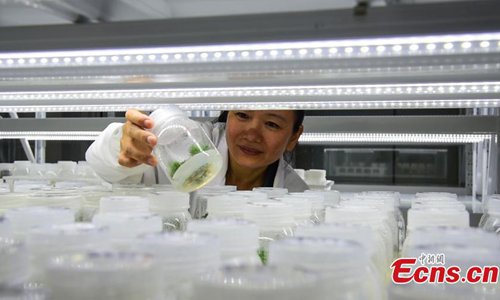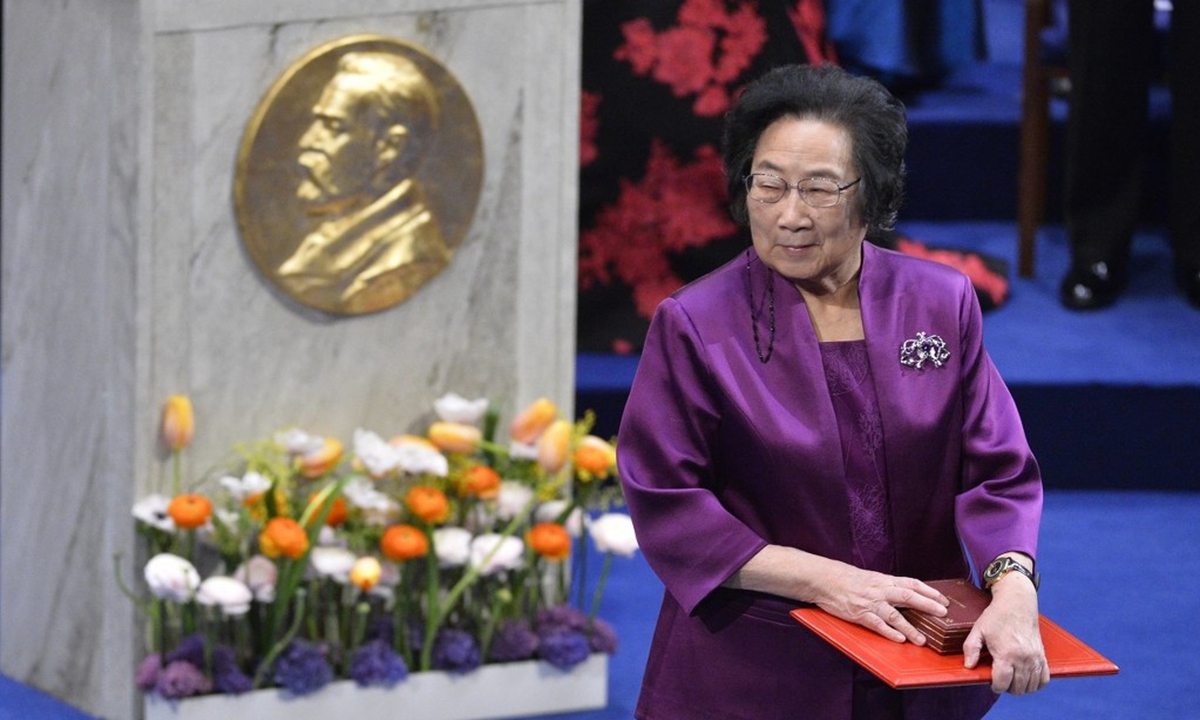
The Artemisia Annua Germplasm Resources Bank in Rong'an County, Southwest China's Guangxi Zhuang Autonomous Region, June 17, 2019. The facility is home to more than 1,000 types of Artemisia Annua, or sweet wormwood, a herb employed in Chinese traditional medicine. The plant seeds are stored at temperatures of minus 80 degrees, minus 25 degrees and room temperature. At the facility, research is underway to better understand seedling cultivation to select the best strain for producing artemisinin, a substance that inhibits the malaria parasite and discovered by Tu Youyou, who won the 2015 Nobel Prize. The facility is also the world's largest producer of artemisinin. (China News Service/Wang Yizhao)
China was officially recognized as malaria-free by the World Health Organization on Wednesday after a 70-year effort. The WHO hailed this as a "notable feat" and a hard-earned success after decades of targeted and sustained action.
The milestone, which saw China go from 30 million cases of the mosquito-borne disease annually in the 1940s to zero cases now, was a miracle for a country with 1.4 billion people, and it highlighted the strong advantages of China's political system and enlightened the world with solutions to address other major infectious diseases including COVID-19, Chinese experts said.
"China's tireless effort to achieve this important milestone demonstrates how strong political commitment and strengthening national health systems can result in eliminating a disease that once was a major public health problem," said Takeshi Kasai, regional director of the WHO's Western Pacific Regional Office.
Wang Wenbin, spokesperson of the Chinese Foreign Ministry, told reporters on Wednesday that the elimination of malaria is a notable feat of China's health endeavor and another major achievement in China's human rights cause, following the elimination of absolute poverty.
It is also a major contribution made by China to the world human rights progress, Wang said.
On Wednesday, Chinese netizens swarmed social media to hail this great achievement, and they called it a gift for the 100th anniversary of the founding of the Communist Party of China (CPC). The topic had garnered nearly 300 million views as of press time on Sina Weibo.
Gao Qi, Chair of National Malaria Experts Group and member of WHO Malaria Policy Advisory Committee, told the Global Times on Wednesday that it is a historic miracle to eradicate malaria in a country with 1.4 billion people that reported 30 million cases of the disease annually in the 1940s.
China has seen no locally transmitted cases of malaria since 2017, warranting the malaria-free credential by the WHO.
"The miracle wouldn't be achieved without China's strong political system under the leadership of the Communist Party of China. China started to draw up practical annual and phased plans to control and eradicate malaria in 1956. Strong leadership ensured those plans were well delivered and implemented at each level of government, and each task was assigned to every individual grass-roots worker," Gao said.
Wang Peiyu, a deputy head of Peking University's School of Public Health, told the Global Times the milestone is another major public health problem that China overcame after smallpox, achieved through strong governance, professional medical workers and advanced technologies.
China's efforts against malaria started in the 1950s, when the disease was rampant in the southern parts of the country that lie close to other hotspots in mainland Southeast Asia. Over the past two decades, China ramped up its efforts and reduced the number of cases in the 1990s from 117,000 to 5,000 annually by providing staff training, laboratory equipment, medicines and new methods to control mosquito propagation, the Xinhua News Agency reported.
The CPC and the Chinese government have always prioritized safeguarding public health and safety. To protect public health, the Chinese government has adopted effective measures, Wang said, highlighting China's efforts in protecting human rights.
China's strong capabilities against major infectious disease are reflected from the elimination of malaria to the combat against COVID-19.
Whether eliminating malaria or fighting against the coronavirus, China has adopted a national plan that coordinates the efforts of every level of government and involves wide community participation. When one patient is found, the country will deploy resources to track the patient down, and detect and control the sources of infection, before the disease has a chance to spread on a broader scale, Gao said.
The "1-3-7" strategy that was first brought up by Gao - one day to report a case, three days to confirm a case and seven days to prevent further spread - was one of the tools of success, and it is still used for travelers coming from malaria-infected countries.
China's eradication of malaria was driven by the goal of eradicating the disease set by the WHO. It is the universal goal that makes China to end the infectious disease possible. As for COVID-19, the complete end of the disease is not promising across the globe, because there is no universal goal to do so when some countries are only busy in politicizing the issue, Gao said, calling for a unified global target to address the infectious disease.
As long as there is one country with COVID-19 patients that doesn't take effective measures against it, the pandemic won't end, he said.
China's experience in addressing malaria offers options for other countries. China will continue to strengthen cooperation for malaria eradication with African countries as well as work with neighboring countries, including Myanmar, Vietnam and Laos, using its abundant expertise and experience in malaria control and elimination, Wang told the Global Times.

Tu Youyou discovered a substance called artemisinin, which can be used to treat malaria. She tested the new drug on herself to accelerate its development, and won the 2015 Nobel Prize for her achievement.
Artemisinin-based combination therapies that were developed by Chinese scientists, led by Nobel Prize winner Tu Youyou, are the primary anti-malarial therapies promoted by the WHO and the most important global weapons against malaria.
Apart from medicines, many Chinese companies also develop and supply a wide range of effective anti-malarial products, including mosquito nets, to African countries, Xinhua reported.
To help malaria-stricken African countries eradicate the infectious disease, Gao said China aims to draw up more systemic plans to help by dispatching teams of medical workers.
Domestically, the risk of imported cases of malaria remains a key concern, so the country has stepped up malaria surveillance and established mechanisms of combating the mosquito-borne disease, according to Gao.




